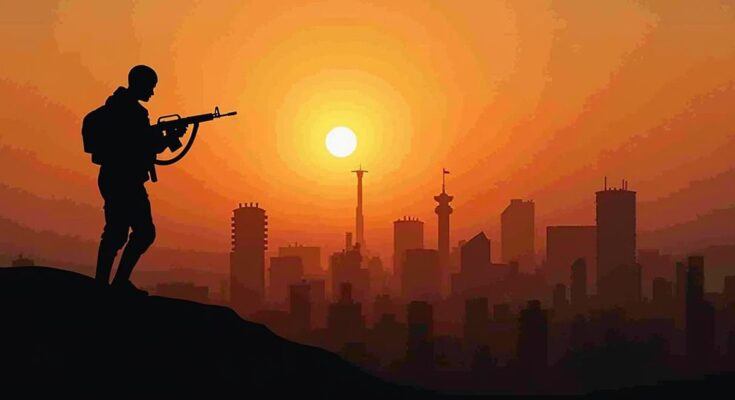The assassination of Hezbollah leader Hassan Nasrallah by Israel escalates tensions in the region, raising critical questions about the potential responses of Hezbollah, Iran, and Israel. While Hezbollah is likely to seek revenge and leverage its arsenal of missiles, Iran may mobilize allied militias for retaliatory actions. Israel, determined to continue its military operations, may consider ground incursions despite the risks involved. The unfolding situation presents a complex challenge with significant implications for regional stability.
In the wake of Israel’s assassination of Hassan Nasrallah, the long-time leader of Hezbollah, the region appears to be edging closer to a broader and potentially devastating conflict involving both Iran and the United States. This pivotal action raises pivotal questions regarding the responses of Hezbollah, Iran, and Israel, each of which is likely to react according to their strategic interests and the unfolding dynamics of the situation. Hezbollah’s Prospects Hezbollah is currently facing significant turmoil, having suffered substantial losses in leadership and military capacity. The assassination has compromised its command structure and has resulted in the destruction of crucial communication channels and weaponry through targeted airstrikes. According to United States-based Middle Eastern security analyst Mohammed Al-Basha, “The loss of Hassan Nasrallah will have significant implications, potentially destabilising the group and altering its political and military strategies in the short term.” Despite these adversities, Hezbollah remains committed to retaliation against Israel, bolstered by a considerable force of seasoned fighters and an arsenal of long-range precision-guided missiles. Should Hezbollah decide to launch a large-scale assault, it risks provoking a severe Israeli counterattack that could devastate Lebanon’s infrastructure and potentially provoke Iranian involvement. Iran’s Response For Iran, the assassination of Nasrallah presents a dual affront, leading to a period of national mourning and heightened security measures, particularly concerning Ayatollah Ali Khamenei to prevent a similar fate. The Iranian regime, reflecting on past humiliations such as the assassination of Hamas leader Ismail Haniyeh, may feel compelled to respond. Iran governs numerous allied militias across the region, collectively known as the “Axis of Resistance,” which includes groups from Yemen, Syria, and Iraq that may be directed to escalate attacks on Israeli and American targets. However, Iran will likely calibrate its response carefully, striving to avoid provoking a war that it cannot sustain. Israel’s Strategic Intentions In light of recent events, Israel has demonstrated a firm commitment to continue its military operations without yielding to calls for a ceasefire, indicating a determined approach to dismantling Hezbollah’s operational capabilities. Present assessments suggest that Hezbollah is currently compromised, prompting Israeli officials to intensify their offensive until the threat of missile attacks is mitigated. A ground incursion into Lebanon remains a possibility; however, it is anticipated that such action would be fraught with difficulty and could prolong conflict on the ground, reminiscent of the protracted nature of operations in Gaza. Israel Defense Forces have signaled their readiness for potential troop deployment near the Lebanese border, anticipating the need for a decisive action against Hezbollah’s military remnants. Nasrallah’s final message to his supporters emphasized that an incursion would constitute a “historic opportunity,” highlighting the multifaceted risks involved for Israel if they choose to proceed with ground operations. Conclusion The assassination of Hassan Nasrallah is a critical juncture in the escalating tensions between Hezbollah, Israel, and Iran. As each party contemplates its next steps, the specter of a wider conflict lingers. Hezbollah’s resilience, Iran’s potential retaliatory measures, and Israel’s strategic calculations will play pivotal roles in shaping the unfolding landscape of this regional conflict. Diplomacy and restraint remain essential to prevent further escalation, but the immediate future is clouded with uncertainty and potential violence.
The current geopolitical landscape surrounding Lebanon, Israel, and Iran is characterized by a heightened state of conflict and volatility. The assassination of Hassan Nasrallah by Israel signals a significant escalation in violence and military strategy among these key players. Hezbollah, an influential militant group in Lebanon, has historically been entrenched in various confrontations with Israel, representing a complex nexus of regional politics and military operations. This situation is compounded by Iran’s strategic interests in the region, as it supports various allied militant groups to counteract Israeli influence and maintain its dominance. The implications of these developments extend beyond regional borders, potentially implicating global powers such as the United States.
The assassination of Hassan Nasrallah has instigated a pivotal shift in the dynamics among Hezbollah, Israel, and Iran, with each actor poised to respond based on their strategic objectives and perceived threats. The ongoing military engagement, potential retaliatory actions, and the spectre of broader regional conflict underscore the precarious situation. Continued vigilance and strategic assessments will be necessary to navigate the ensuing fallout and to avert further escalation into a full-scale war.
Original Source: www.bbc.com




